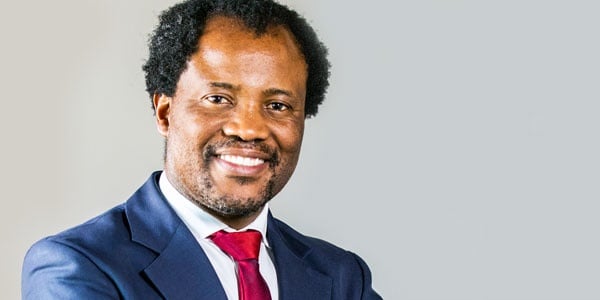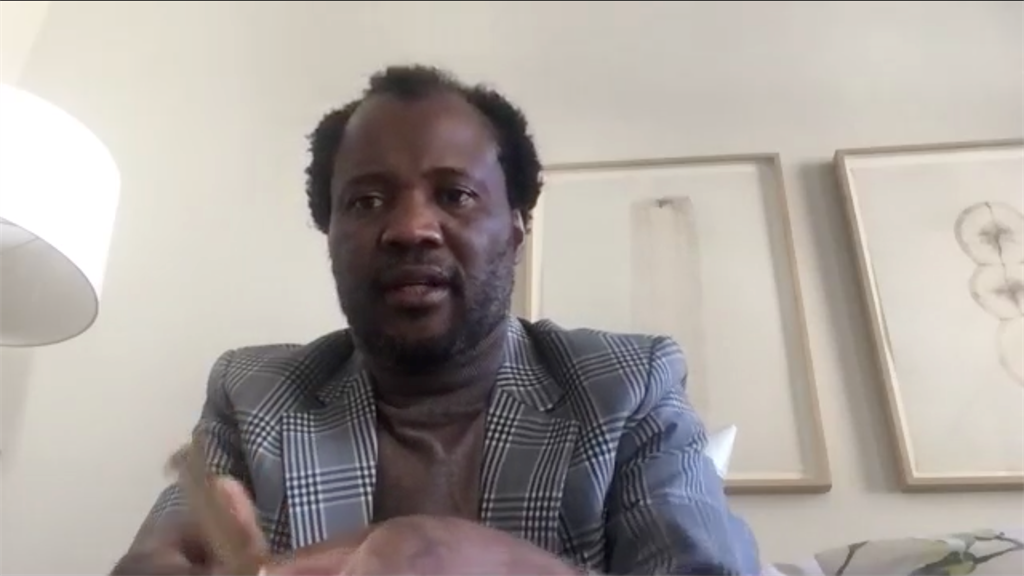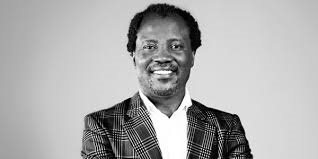Wits’ new Vice-Chancellor Zeblon Vilakazi, born in Katlehong, Ekurhuleni, and one of the first Africans to work at Cern in Geneva, admitted that the university made mistakes with #FeesMustFall, and shares his dream of making it a hotbed for innovation, while changing the curriculum within two years.
Witwatersrand University’s newly appointed vice-chancellor Zeblon Vilakazi has grand plans to turn the 98-year-old university into an incubation space for technology and entrepreneurship in South Africa, and Africa.
Renaissance man Vilakazi, who speaks French, German, Zulu, Siswati, Sesotho, Afrikaans and English, says he wants to make Wits the Massachusetts Institute of Technology (MIT) of South Africa to deliver similar world-changing technologies.
He says MIT and Stanford University, based in the US, are some of the only universities in the world to be socially, creatively and technically innovative – and therefore produced the current wave of technology companies – because they had unique lifestyles that sparked it, and he wants to replicate it in Johannesburg.
“You’ve got art galleries, you’ve got bookstores, you’ve got jazz clubs, you’ve got bars, and that’s what you can create for an urban creative hub, which will start from the university down to Nelson Mandela bridge were basically people of all courses of life can come together,” Vilakazi says, visibly excited about his plans, admitting that he’d need the City’s help to create it.
The nuclear physicist is, however, quick to admit that Wits won’t be able to replicate a coastal free-thinking lifestyle of other universities, but he says the university is set apart by urban density which is “almost like creating an internal combustion engine” for the ideas to come out.



Incoming Wits Vice-Chancellor Zeblon Vilakazi (@Wits_News)
“And because of the discomfort in the social pressures, it forces [people] to think in a space that is uncomfortable because as the old English cliche goes: necessity is the mother of invention. And so I think that it is this kind of a pressure dynamic that will force us to be creative.”
READ HERE | Incoming Wits VC already knows that ‘inequality and exclusion’ will be his big challenge
“[Wits] must be unique to Johannesburg, we cannot replicate the University of Cape Town (UCT). We cannot replicate the Cape Winelands, which speaks to a particular lifestyle, but we at Wits talk about a lifestyle of the groove, to use the language of young people.”
Not used to the media
Speaking to News24 in a virtual interview (the university didn’t want the 51-year-old to attend any physical interviews in light of Covid-19), Vilakazi says he has been doing non-stop media interviews since his appointment was announced a week ago.
I think I’m still on a high.
Dressed in a brown poloneck jersey, and checkered grey jacket in his home Illovo – simple ink pen illustrations hanging behind him on beige walls – Vilakazi is quick to point out that he will not be like his predecessor Adam Habib who he still refers to as “the boss”.
The boss’ term is only set to come to an end in December when Habib heads to London to lead the School of Oriental and African Studies. In the meantime, Vilakazi will slowly start to take over.
My background is in the sciences, so I’m not used to the media.
“My predecessor, Professor Habib is very adept at media. His nature as a public intellectual lends itself to a much stronger engagement. So I told him that I have to learn the bit up from him on public engagement,” Vilakazi says smiling. “But I think it’s been good so far.”
Vilakazi, who served on the university management team as deputy vice-chancellor for research and postgraduate affairs since 2014, admits that it’s daunting to take over from Habib, whose term was even celebrated by #FeesMustFall activist and former Student Representative Council (SRC) president Mcebo Dlamini who repeatedly clashed with the university.
However, Vilakazi says he is grateful that he was part of the university management during the student protests of 2015 which helped prepare him for the role.
I learned from the mistakes we made, and the good decisions we took. So I think I go to this next phase, and it will be different, but at least with the little experience that I have.
“They’ll always be a challenge. And I think you know, I don’t think we dealt with #FeesMustFall perfectly well, but we dealt with it with the amount of knowledge that is available in front of us.”
“So likewise, with the new challenges that will come. Not even related to exclusion, but it will be about something else, right? And you need to learn from the experiences.”



Prof Zeblon Vilakazi during his interview with News24.
Vilakazi, who studied in Manchester in the UK and obtained his PhD from Wits in Physics in 1998, and who has co-authored over 230 research papers – believes the role of a university is to create a “sandpit” for students to challenge their views.
READ | Racial tensions flare up ahead of new Wits vice-chancellor’s appointment
“What attracts young people to university is not about content. I mean a smart kid can download content from Google. I mean, who needs a library; who needs an instructor: a middle-aged old person telling youngsters, when, if they are smart enough, they can learn it? People learn programming themselves?”
He says the university space, therefore, is the “third curriculum” where students of diverse backgrounds come to interact and experiment with ideas.
It’s the rite of passage of a young person from the age of 18 to 22, where society gives them, I’d call it a sandpit, where they play. Where the normal rules that apply to an 18 or 21-year-old who works in the real world, don’t apply to them.
“They’re given the space to push the boundaries, by the way, to protest, to discover new ideas to discover ideologies that differ from their parents, to experiment with ideologies to meet people.”
Let the whole thing work itself
“And then at 24, then you’re a different person, of course, you come back to the real world where you got to pay your taxes, you get married, you have a partner and then all that youthful exuberance goes.”
READ | ‘Education is more than receiving content. It is about interaction’ – incoming Wits VC
Vilakazi, who is hesitant to call himself the father of these students as “they are already young adults”, says his role is, therefore, to put the boundaries of the sandpit in place which will naturally create conflict with students.
“We come back to this whole thing of creating this hotbed of incubation and creativity. I’m not going to predict what’s gonna happen. You just put in, you know, when you cook, you improvise in the ingredients, and then let’s let the whole thing work itself,” he says.
“In short that there’s an administrator which ensures that you’ve got safety on campus, safety away from campus, that you deal with gender-based violence, that young women feel free to move around, that you deal with unnecessary, you know, tension among students and then they know how to solve the differences in a mature way.”
You just set the parameters and let the ideas flourish. So I think that is my goal. That’s my dream of this university.
But, he is also quick to add that the interaction between students cannot be forced (like it was proposed at Stellenbosch University with its Maties101 course), and may take place, among others, on the sports field, social spaces, societies, political movements, and classrooms themselves where students should experience “healthy discomfort”.
Growing pains are not easy, you must be uncomfortable when you learn.
Around the use of liquor, and South Africa’s often abusive relationship with it, which often leads to gender-based violence – particularly on university campuses – Vilakazi says he does not believe in the prohibition of liquor, but rather managing it.
He says where rules are too restrictive, people break them and it creates a culture of lawlessness, and the country should instead start building a healthier relationship with the use of liquor.
Abuse, violence
“You know, there’s a lot of a youthful immaturity and young people must be allowed to find a way within bounds of course,” he says, adding that it is a phase all people go through.
“You must be strict with bars to only let people who actually maintain the rules in. That requires management, but not policing. A healthy drinking lifestyle is important because the thing about prohibition, it must not become too prohibitive because then abuse happens, right?”
But I do worry about abuse and the violence and that trauma that’s associated with irresponsible drinking, and I think that is something that is debatable, you know.
One thing Vilakazi does, however, want to challenge at the university is the current “silo thinking” in academic fields.
“Yes, you must maintain a disciplinary strength. I mean someone who does maths must be good at math, someone that does literature must be good at literature. That’s their speciality. But also, it doesn’t hurt if someone who is doing a Bachelor of Science degree, does something on history, on sociology to understand the society they live in.”
“A medical doctor must understand political history, that you know, where you’ve got discussion taking place around, for example, Covid, other communities get more affected than others, that’s why we need socially aware doctors.”
So I do think that there will be in the next two years transformation of the curriculum to reflect all these changes.
He says he also hopes to do more to get black women into senior positions at the university to create role models for other women to follow.



Zeblon Vilakazi (Supplied, Witwatersrand University)
Vilakazi was born in Katlehong, Ekurhuleni, as the youngest of a family of eight. His mother was a housewife, and his father ran a small shop in the community.
From there he would go on to be one of the first students from Africa to conduct PhD research at the European Centre for Nuclear Research (Cern) in Geneva, Switzerland, before joining UCT as a lecturer, and then moving to Wits.
“I’m not saying this to sound modest, but I think these things are a question of luck and opportunity that arises. You know, those are difficult times when I grew up in those areas in the 1980s.”
“But, I think there were people who actually were there to give me the opportunities to explore possibilities of applying for a scholarship, doing all the tests that are required, and getting the scholarship.”
You know it’s not about being a genius. No, I am not.
The father of three, says he met his wife Mary Vilakazi, who is now the Chief Operating Officer of First Rand, through mutual friends while studying at Wits. “She supports me, I am the academic,” Vilakazi says jokingly.
During challenging times of his life, particularly during #FeesMustFall, Vilakazi says running kept him grounded.
Temples of knowledge
He also frequently practices Tai Chi, and enjoys cooking a lamb roast (with a glass of Shiraz) for his family on Sundays.
“And I like classical music and jazz. Even my kids know that on Sunday mornings [we play] jazz, and in the afternoon over dinner [we play] classical music, mostly Bach,” Vilakazi says, adding that his favourite book is Russian author Dostoevsky’s acclaimed novel Crime and Punishment.
Vilakazi says he never dreamt of being Vice-Chancellor one day, but was actually planning on being a professor doing the research he loves and becoming “famous scientifically”.
In the same way as he hopes to create an environment for innovation at Wits, he says he took on the opportunities life granted to him to end up where he is today.
And when he one day leaves the university, completing his term as Vice-Chancellor, Vilakazi says he hopes his story will inspire others.
“It’s not just Wits, it’s that society needs hope. Society needs inspiration. I like to see Wits as a beacon of reason, tolerance, and with my life story, what seems impossible is possible that, you know, the apex of aspiration for every South African to think: ‘I can be a better individual in society’,” Vilakazi says as the interview draws to a close.
“That’s what universities are about: temples of knowledge, temples of thought, reason and critical thinking. That’s all.”

